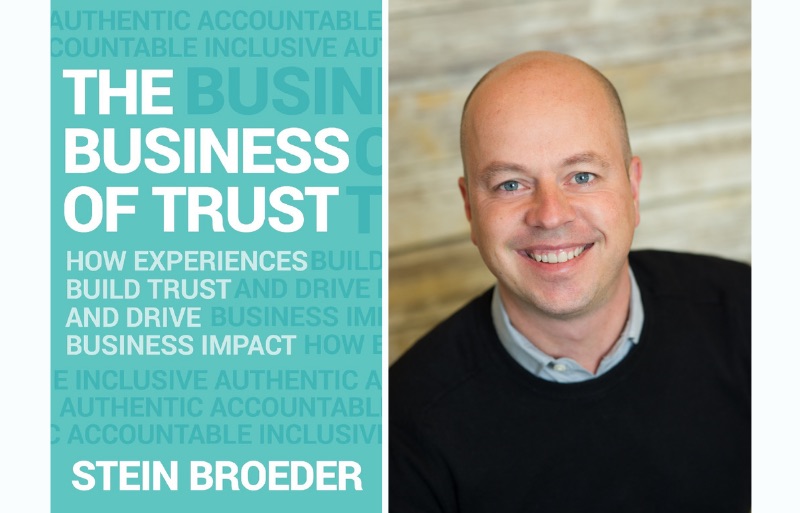The Business of Trust: How Experiences Build Trust and Drive Business Impact

An interview with author Stein Broeder.
In my ongoing pursuit of knowledge about trust and its impact on brands, I came across the book, The Business of Trust: How Experiences Build Trust and Drive Business Impact. After scanning the book’s synopsis on Amazon, I knew I had to make a connection with the author, Stein Broeder.
“We have a trust problem. Due to the rapid proliferation of data and technology across society, a disconnect has formed between employees and customers; the organizations they service and those that service them. This is causing an erosion of trust.”
In an act of unabashed curiosity and uncharacteristic confidence, I emailed Stein to introduce myself, share details about Upright and invite him to take part in an interview for the Upright Insights blog. To my surprise and delight, he agreed and we established a dialogue. In addition to being an author, Stein is also an award-winning marketing executive with more than 18 years of industry experience. Throughout his career, he has worked with Fortune 500 companies such as Microsoft, Alaska Airlines, and Johnson & Johnson to bring products to market and build engaging experiences for customers.
Stein’s decision to write The Business of Trust came after years of witnessing business leaders and organizations struggle to realize the true potential of trust—and how it drives real business impact. He says his approach is best described as part art, part science, and 100 percent authentic.
Here’s more from Stein in his own words.

Why is earning trust an important focus for organizations and businesses?
Trust is the most important asset for any company. Without trust, nothing is possible. The more trust is built, the more loyal customers become. And loyal customers will advocate for you. And the best way to build that trust is through creating meaningful and memorable experiences for your customers.
What is the economic connection between trust and business success?
Without trust, speed goes down and costs go up. With trust, speed goes up and costs go down. A recent Accenture Strategy study of 25,000 global consumers found that, of customers who switched companies in the past year, 46 percent did so because they lost trust in the company.
What are trust drivers and how should an organization or business leverage them?
On the most basic level, we know trust comes down to two things: character and competence. Character lies below the surface, and competence is easily discerned. Character is defined by integrity and intent. Competence materializes as capabilities and results. Doing the right thing, demonstrating domain expertise, and delivering positive outcomes help build confidence and trust. While character and competence are the foundation, they aren’t necessarily always easy to turn into action. For leaders and organizations to translate those foundational concepts into actionable behaviors that will earn trust, they need to focus on the following trust drivers:
- Authenticity
- Accountability
- Inclusion
Authenticity is about purpose and values. Accountability is about responsibility and ownership. Inclusion is about empathy and a growth mindset. When leaders and organizations take these trust drivers to heart and focus their efforts on building teams, products, and services that demonstrate integrity (character) and results (competence), trust will follow.
When does trust impact the marketing funnel?
Trust impacts the marketing funnel at every stage. And marketers should be acutely aware of this when they are building campaigns. Although we are all mindful that the customer journey is not linear, I believe it is still helpful to think about the different stages of the funnel when determining the purpose of your content. There are opportunities to build trust all the way down the funnel and it starts with awareness. What do you know about a brand? What have you read? This points to the importance of trustworthy content. Then at the evaluation stage, you want to be sure that you have built up your loyal customers to be advocates in order for them to then transition to becoming trusted sources for others. Then you further build trust by ensuring that you have a smooth customer experience from a purchasing perspective. All the customer experiences in the funnel should build trust. If everything goes according to plan, what you earn from a business perspective is a loyal customer advocate. And if it doesn’t, you always have the opportunity to rebuild trust.
What are some ways organizations and business leaders can drive real business impact by optimizing their customer experience to earn and build trust?
By using data and AI to create truly unique, personalized experiences. This takes a lot of effort but by anticipating the customer’s needs and preferences you make things easier and save them time and effort. Combine that with great customer service and you have a winning recipe for building customer trust. A great example of this is Amazon. They pride themselves on customer-centricity and it shows. From a B2B perspective, organizations should focus on providing content that meets customers’ pain points and does it consistently. That’s one of the keys. Become your customer’s go-to resource and do it without selling. That’s the hard part. But once you have built up that trust they won’t want to purchase elsewhere.
Do you have an example of an organization or business that is successful at building trust? What are they doing right? What do others do wrong?
I believe Amazon is very successful at building trust. Loyalty is one of the outcomes of building trust and I believe they have a very loyal customer base. Another company that excels at building trust is Microsoft. They score high trust-building marks in the “taking a stand” and societal issues category. From a product standpoint, I would say Peloton is a good example. When a product achieves almost cult-like status you know trust played a big role. The funny thing about trust is that you can bounce back. You can re-build trust. It’s just harder in some cases than it is in others. Facebook and Uber are good examples of companies that took a trust hit. Even though they continue to be successful I would argue they would be a lot more successful had customers not lost trust.
What is the key takeaway from your book The Business of Trust: How Trust Creates Business Value Through Employee and Customer Experience?
Trust happens by design. You cannot rely on trust just happening. You can and need to design earning and building trust into how you behave and how your organization operates.
Stein currently lives in Washington with his wife and two children. In his mission to support trust-building communities, Stein has partnered with the Boys & Girls Club of America to donate the net proceeds from the sale of his book. Through this partnership, he hopes to help foster productive, caring, and trustworthy citizens of the future.

